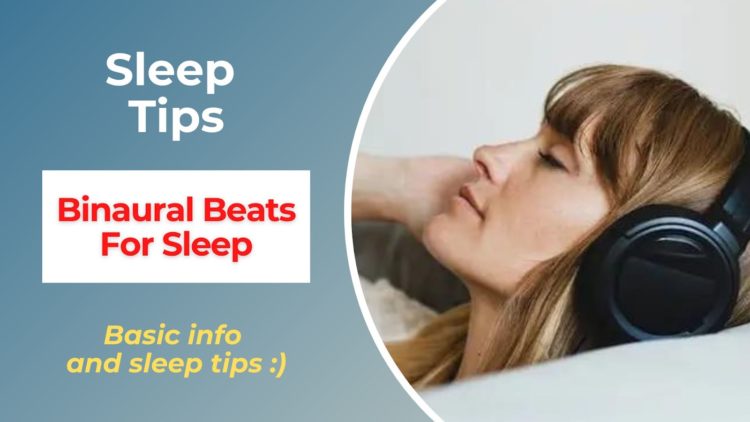
Do you have trouble sleeping? If so, you’re not alone. Millions of people around the world suffer from sleep deprivation and insomnia.
Many things can cause sleep problems, including noise pollution, stress, and anxiety.
In this blog post, we will discuss binaural beats for sleep and how they can help you get a good night’s rest.
We’ll also dispel some common misconceptions about binaural beats and provide links to some scientific articles that support their use.
Finally, we’ll give you some tips on how to get a good night’s sleep despite noise pollution.
I Went From 7 Hours of Sleep Per Night To 8
As you can see I am a fan of tracking my sleep, which is one of the tips I list down below.
However, what you don’t hear on this graph are the binaural beats I started playing at night to help me get to sleep.
Because it’s one thing to track your sleep, but it’s another thing to actually get sleep!
Sometimes you turn on your sleep tracker but just toss and turn! So how do you actually get better sleep, go to bed faster, and stay asleep?
I’ll suggest a few tips below, but the main thing I want to focus on here are binaural beats.
So, what are binaural beats?
Binaural beats are auditory illusions created when two different sounds are played in each ear. The brain perceives these two sounds as one beat.
The frequency of the beat is determined by the difference between the frequencies of the two sounds. For example, if a sound with a frequency of 200 Hz is played in one ear and a sound with a frequency of 210 Hz is played in the other ear, the binaural beat will have a frequency of 10 Hz.
Binaural beats have been scientifically shown to affect brainwave activity and can be used to induce various states of consciousness, including relaxation and sleep.
Plus, there are many different types of binaural beats, each with its own unique frequency. These days there are free online mixers where you can play around and have some fun creating your own frequencies too!
Some common frequencies used for sleep are:
- Delta waves (0.50-40 Hz): These are the slowest brainwaves and are associated with deep sleep and relaxation (listen here).
- Theta waves (41-14 Hz): These are slower than alpha waves and are associated with light sleep and drowsiness (listen here).
- Alpha waves (13-39 Hz): These are fast brain waves that are associated with wakefulness and alertness (listen here).
So how do binaural beats help you sleep?
Binaural beats help you sleep primarily because they drown out background noise.
I live in the Bay Area where street noises can wake me up at night, not to mention sometimes the TV is on in the other room!
Binaural beats make it so I cannot distinguish these sounds and therefore they don’t wake me up.
It’s very similar to playing classical music before bedtime to help relax and block out noise from the outside. However, I’ve noticed that classical music and even bedtime lullabies actually wake me up!
Call me a sensitive sleeper, but even soft classical music has crescendos and some songs are louder than other songs.
The key thing about binaural beats is they stay the same volume, but also pulsate a little bit. If you’ve ever tried white noise it’s similar, but binaural beats have more of a subtle pulse to them.
Types of binaural beats
- Delta waves are the type of brainwave that is most active during deep, restful sleep. By listening to delta wave binaural beats, you can train your brain to produce more delta waves, which will help you sleep better.
- Theta wave binaural beats are also helpful for sleep. Theta waves are associated with light sleep and drowsiness, so listening to theta wave binaural beats can help you fall asleep and stay asleep.
- Alpha waves, on the other hand, are not typically associated with sleep. However, some people find that listening to alpha wave binaural beats helps them relax and fall asleep.
If you’re not sure which type of binaural beat is right for you, there are many free online playlists that allow you to try different frequencies and see how they affect you.
You can also experiment! There are more frequencies than the 3 listed above and there are many free online mixers that allow you to mix and match binaural beats and listen to them on your computer or mobile device.
Summary – Binaural beats help block out noise. If even quiet background music wakes you up in the middle of the night, trying binaural beats may be especially helpful.
Now that we’ve discussed binaural beats, let’s dispel some common misconceptions about them.
Binaural beats misconceptions
One common misconception is that binaural beats are dangerous. This is not true. Binaural beats are safe for most people to listen to.
However, if you have epilepsy or are pregnant, you should check with your doctor before using binaural beats.
Another common misconception is that you need special equipment to listen to binaural beats. This is also not true. All you need is a pair of headphones and an internet connection.
Finally, some people believe that you need to listen to binaural beats for hours at a time to see any benefit. This is also not true. You can experience the benefits of binaural beats after just a few minutes of listening.
If you find that you enjoy listening to binaural beats and want to continue using them, there is no harm in doing so. However, if you find that binaural beats are not for you, there is no need to force yourself to listen to them.
Now that we’ve discussed binaural beats and dispelled some common misconceptions about them, let’s talk about some tips for getting a good night’s sleep in spite of noise pollution.
Get Better Sleep Tips
When I went from 7 hours of average sleep per night to 8, I did a few things.
Yes, I started playing binaural beats during bedtime (and throughout the whole night) so I would relax before bed and then not wake up due to random noise.
But I also:
Limited alcohol intake
Avoiding alcohol before bed is perhaps the most important thing you can do.
Alcohol disrupts REM sleep so even if you’re asleep, your brain isn’t storing information properly.
Of course, you may know this already, but you may feel like you need alcohol to go to bed.
If you need alcohol before bed, I’m going to encourage you to listen to Fit Recovery’s podcast “Getting Better Sleep After You Stop Drinking Alcohol” for more info.
Made my room dark as possible
I’m talking as little light as possible because I have the worst angle in my room.
The sun beams can blare through my window shades even if they are fully down.
Fortunately, there are cheap sticky window shaders you can purchase online ($10).
So do all the normal things to minimize light like close the blinds, wear an eye patch, and set your screen to automatically dim to minimize blue light.
Put my phone on Do Not Disturb mode so I wouldn’t be woken up by notifications in the middle of the night
This is key.
I know many parents and business owners feel they cannot turn off the notifications because their child might text or something may need their urgent attention.
However, if you set up an auto-responder on your email and texts that says you will respond in the morning, it takes away that sense of urgency.
You can always have a designated person to contact in case of emergency who can easily get a hold of you if need be.
Furthermore, you can turn off the notifications for your social media and email while leaving your text notifications.
That way you truly will only get woken up when needed.
Set a regular bedtime and wake time and stuck to it as much as possible
Easier said than done, but aim for going to bed at the same time every night and waking up at the same time each morning.
This will help train your body to know when it’s time to sleep and when it’s time to wake up.
Of course, there will be times when you have to break this rule, but try to stick with it as much as possible.
Something warm before bedtime
I’m not a big fan of drinking warm milk before bed, but I am a fan of taking a hot shower.
If you don’t have time for a bath or shower, try putting a heating pad on your bed for 15-20 minutes before you go to sleep.
The warmth relaxes your body and makes it feel like it’s time to sleep.
Of course, there’s Chamomile tea too, but the key is warmth.
You want to give your body a sensory experience so that it feels like it’s time to sleep. Because while you may “know” it’s time for bed unless you “feel” like sleeping it just won’t happen!
This same principle is the key behind binaural beats too. While not warm, they are still giving you a new sensory experience that signals to your body to slow down, it’s time to sleep.
Stretching
I am also a fan of stretching before bed.
I used to have really bad cramps, so I would do some light stretching and/or yoga poses before bed to help relax my muscles.
Stretching not only helps with muscle relaxation, but it can also help improve your flexibility and range of motion.
Limit caffeine intake
This one is pretty self-explanatory.
Caffeine is a stimulant, so it’s best to avoid it close to bedtime.
If you need caffeine, try to limit your intake to early in the day and drink decaffeinated beverages later on.
Try a sleep supplement
I personally like taking melatonin before bed because it helps with muscle relaxation.
While I’m aware that the science on Melatonin is mixed, the placebo effect is real!
Sometimes taking a sleep supplement can help you shift your mindset to be ready for bed.
There are many different sleep supplements on the market, so it’s best to do your research to find the best supplement that is right for you.
Conclusion
These are just some of the things that worked for me. Everyone is different, so experiment and find what works for you.
And don’t forget, if you have trouble sleeping, there’s no shame in seeking professional help.
A sleep doctor can help you identify any underlying sleep disorders and develop a treatment plan.
Jared Levenson is the coach and writer behind Eating Enlightenment, a 4 year old blog focusing on intuitive eating and nutrition. Jared lived for 13 months in a Zen Buddhist monastery and is a Certified Intuitive Eating Counselor.
Author
-
A decade+ addiction-free, Chris Scott, the visionary founder of Fit Recovery, passionately guides Fit Recovery 2.0 Members toward a vibrant, healthier lifestyle. Through the integration of groundbreaking nutritional strategies, transformative reframing techniques, neurolinguistic programming, and dynamic pro-recovery habit systems, he inspires individuals to boldly take charge of their lives and break free from alcohol. Chris is celebrated as a Professional Member of the Alliance For Addiction Solutions. Moreover, he is the proud author of the bestselling book "Drinking Sucks!" which stands as a vital beacon of hope for those yearning to quit drinking. Additionally, he created the celebrated online program Fit Recovery 2.0, designed to provide unwavering support for individuals embarking on their recovery journey.
View all posts Fit Recovery Founder & Director









